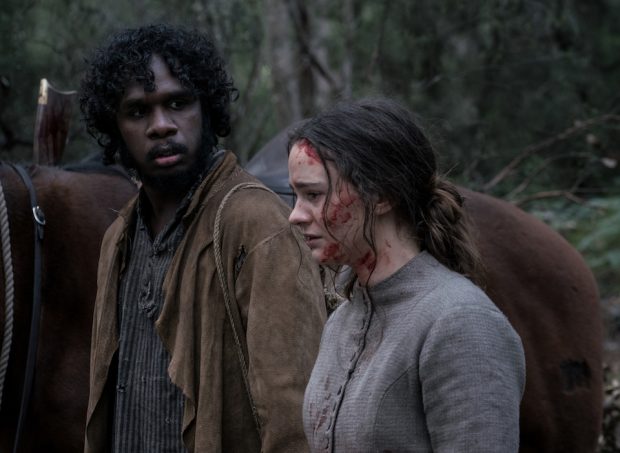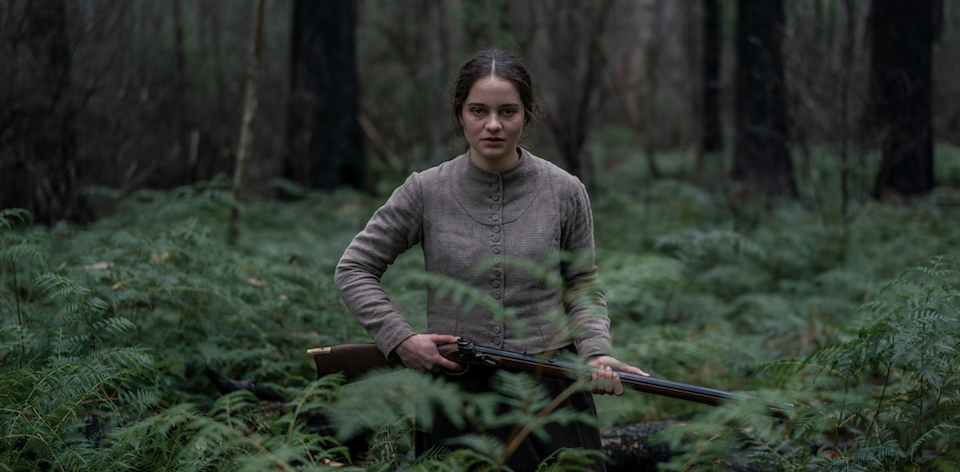While THE NIGHTINGALE made its Australian debut at the Adelaide Film Festival in 2018, following a premiere in Venice that year, Jennifer Kent’s second feature has rapidly become one of the most divisive films of 2019. Her follow-up to the cult hit The Babadook made headlines during the Sydney Film Festival this year when the film’s content prompted multiple walkouts and vocal departures.
Set in colonial Tasmania in 1825, Kent’s screenplay follows 21-year-old Irish convict Clare (Aisling Franciosi). After being raped and beaten by British officer Hawkins (Sam Claflin), her husband and infant are murdered by his fellow soldiers (including Damon Herriman as Ruse). As a former convict, her story is dismissed, so she takes the reluctant Aboriginal guide Billy (Baykali Ganambarr) to help her navigate the dense wilderness and find a kind of revenge.
THE NIGHTINGALE is a difficult film to navigate. Multiple rapes, acts of violence, and racial vilification might be an accurate summation of life for women and Indigenous peoples of the era, but that doesn’t necessarily make for easy access. Kent doesn’t want us to be comfortable, of course, as these are issues and moments that should continue to shock well into the 21st century. It’s not like violence against women or Indigenous land rights have been solved with the passing of time.

One of the points of contention with some members of the audience is the sheer amount of sexual assault on screen. By the midway point of the film, there have been at least five counts of rape perpetrated on screen at length. Indeed, one viewer reportedly yelled “I’m not watching this, she’s already been raped twice” as she left the theatre. Which naturally sparks a debate around whether this film had gone “too far.”
In the essay “The Careless Language of Sexual Violence” in Bad Feminist (2014), Roxane Gay talks about how most media depictions of rape, such as the weekly escalations of violence on Law & Order: SVU, have made us “numb” to the shock of it. “We need to find…ways of rewriting that restore the actual violence to these crimes and make it impossible for men to be excused for committing atrocities,” she adds. Which is precisely what Kent aims to do here, offering something that it is impossible to be ambiguous about.
Kent tackles the treatment of Indigenous peoples with similar directness. Sexualised violence is directed against one Aboriginal woman in particular throughout the film in a series of troubling scenes, but also acts as a catalyst for a different revenge story. The narrative around Baykali Ganambarr’s character leans towards being a little didactic, although at its best he plainly states: “This is my country. This is my home.” At other times, the attempted moments of understanding (“You know what it’s like to have a white fella take everything from you”) feel too simplistic.
Franciosi is excellent in the lead role, carrying virtually every scene in the film. There are times when the camera stays entirely on her face during moments of great anguish, and at others times she is carried away by a nightmarish series of cutaways and dream sequences.
It’s unfortunate then that the violence escalates to a point of splatter gore and about the halfway mark, such that we might actually be numbed to the remainder of the film. Indeed, after the arresting first half, Kent’s relentless vision will continue to polarise audiences until the very end. Nevertheless, it’s an unquestionably important film, and one can’t help but wonder if a film of this nature could ever be made in a contemporary setting.
2018 | Australia | DIRECTOR: Jennifer Kent | WRITERS: Jennifer Kent | CAST: Aisling Franciosi,Sam Claflin, Baykali Ganambarr, Damon Herriman | DISTRIBUTOR: Transmission Films (AUS) | RUNNING TIME: 106 minutes | RELEASE DATE: 29 August 2019 (AUS), 1-18 August 2019 (MIFF)






